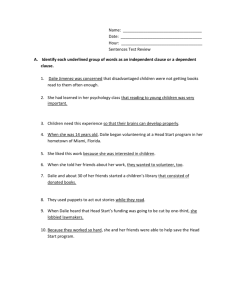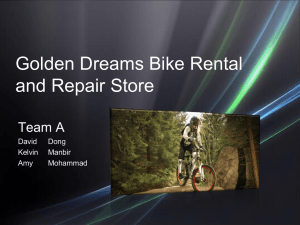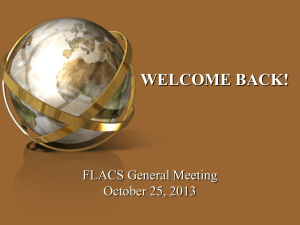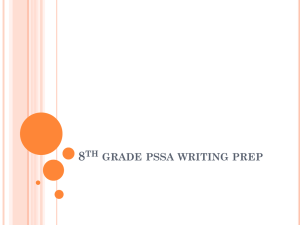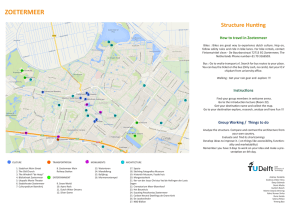From Junk to Love
advertisement
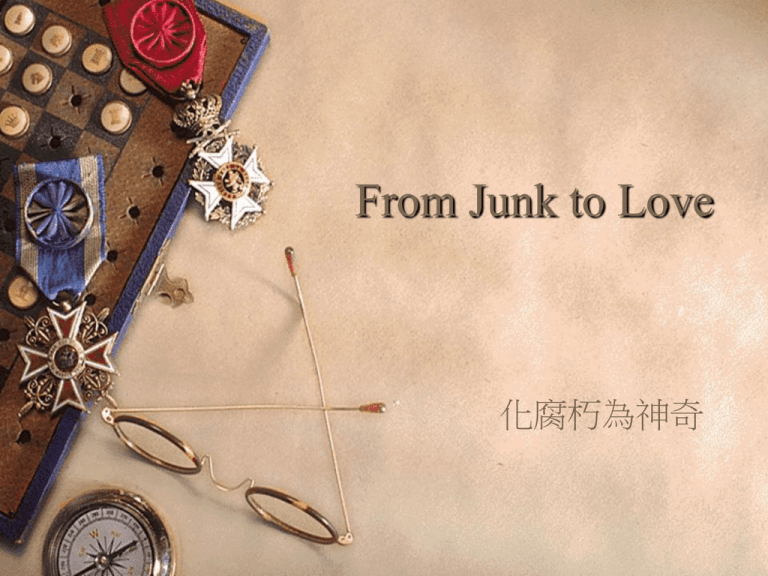
From Junk to Love 化腐朽為神奇 Different Parts of a Bicycle Paragraph 1-1 Something about the battered old bicycle at the garage sale caught the eye of fourteen-year-old Justin Lebo. It was a BMX bike with a twenty-inch frame. Everything on it was bent or broken. Justin bargained the owner down to $6.50 and loaded the bike into the back of his father’s car. Paragraph 1-2 After they got home, Justin and his father cleared out a work space in the garage and they replaced the broken pedal, put on a new seat, and restored the grips. In less than a week, the bike looked brand-new. Paragraph 2 However, Justin soon forgot about the bike. Not long after, he bought another beat-up bicycle at a yard sale and fixed it up, too. After a while it bothered him that he wasn’t really using either bike. He realized that what he liked was not riding the old bikes, but the challenge of making something new and useful out of something old and broken. --Paragraph 1-1- catch one’s eye 引起某人注意 =attract/draw one’s attention Cf. broken vs. broke – broken 受到毀損的;破損的 – broke 破產的 --Paragraph 1-2- replace A with B 以B代替A = substitute B for A Ex. We replace typewriters with computers. =We substitute computers for typewriters. less than 少於 no less than (1)不少於 (2) 至少=at least Paragraph 3-1 Justin wondered what he should do with them. Then he remembered that when he was younger, he used to live near a large brick building called Kilbarchan Home for Boys. It was a place for boys whose parents couldn’t care for them for one reason or another. So he decided to donate the bikes to those unfortunate boys. Paragraph 3-2 The next day when Justin and his mother unloaded the bikes at the Home, two boys raced out to greet them. They leapt aboard the bikes and started riding them around and around the driveway. Paragraph 4 The Lebos watched for a while and then started to get into their car to go home. “Wait a minute! one of the boys called out. You forgot your bikes! Justin explained that the bikes were now theirs to keep. “They were so happy,” Justin remembers. “It was like they couldn’t believe it. It made me feel really good to see them so happy.” --Paragraph 3-1- fortunate / unfortunate fortune /misfortune adj. n. – Misfortune never come singly. – Misfortunes tell us what fortune is. – If fortune smiles, … --Paragraph 3-2- leap, leaped, leaped (leap, leapt, leapt) – Look before you leap. =Think twice (before you leap.) Cf. “跳” – jump – leap – hop --Paragraph 4- You use “for” to say how long something lasts or continues. – for a while 一陣子 – Cf. after a while 過了一會兒 once in a while 偶爾;有時 call out = cry out Paragraph 5-1 On the way home, Justin was silent. He was thinking about what would happen once those bikes got wheeled inside and everybody saw them. How could all those kids decide who got to ride the bikes? Only two bikes for so many boys was just asking for trouble. Paragraph 5-2 “Mom,” Justin said, as they turned onto their street. “I’m going to make a bike for every boy at Kilbarchan for Christmas.” When they got home, Justin called Kilbarchan and found out there were twenty-one boys. It was already June. He had six months to make nineteen bikes. That was almost a bike a week. Paragraph 6 Justin and his mother spent most of June and July hunting for cheap bikes at garage sales and thrift shops. But by the beginning of August, Justin had managed to make only ten bikes. Summer vacation was almost over, and school and homework would soon cut into his time. Garage sales would dry up when it got colder, and Justin was out of money. But still, he was determined to find a way. Paragraph 7 At the end of August, Justin got a break. A neighbor wrote a letter to the local newspaper describing Justin’s project, and an editor thought it would make a good story. In her admiring article about a boy who was devoting his summer to helping kids he didn’t even know, she said Justin needed bikes and money, and she printed his home phone number. --Paragraph 5-1- wheel v. – If you wheel something which has wheels on it, you push it along. – Ex. He wheeled his bike through the alley. got to 有機會做…;必需,一定 – Ex. I never got to ride in a Concorde. – Ex. I’m not satisfied with my grades, but I got to accept it. -- Paragraph 6- by +時間 ph. 到…的時候,常與完成式連用 – Ex. By next month, the couple will have been married for fifty years! manage to V. 成功做到… – Cf. try to v. 設法做到… S be determined to V. S 下定決心去做… = S make up one’s mind to V. -- Paragraph 7- story 報導 – make a good story 成為一篇不錯的報導 – print a story on sth. 發表關於…的報導 – cover story 封面報導/封面故事 devote sth. to sb./sth. 把…奉獻給… =dedicate sth. to sb./sth. – Ex. The doctor devoted/dedicated his life to helping AIDS patients. Paragraph 8 The week before Christmas Justin delivered the last of the twenty-one bikes to Kilbarchan. Once again, the boys poured out of the home and leapt aboard the bikes, riding them happily around in the snow. Once again, their joy inspired Justin. They reminded him how important bikes were to him. Wheels meant freedom. He thought about how much the freedom to ride must mean to these boys. They had so little freedom in their lives. And so he decided to keep on building. Paragraph 9 “First I made eleven bikes for the children in a foster home, then I made bikes for all the women in a battered woman’s shelter. Then I made ten little bikes and tricycles for children with AIDS. Then I made twenty-three bikes for the Paterson Housing Coalition. Paragraph 10-1 Justin Lebo is often asked the question, “Why do you do it?” This question seems to make him uncomfortable. It’s as if the reporters and interviewers want him to say what a great person he is. Their stories always make him seem like a saint, which he knows he isn’t. Paragraph 10-2 “I don’t have to, but I want to. In part, I do it for myself. I don’t think you can ever really do anything to help anybody else if it doesn’t make you happy. Once I overheard a kid who got one of my bikes say, ‘A bike is like a book; it opens up a whole new world.’ That’s how I feel, too. It made me happy to know that kid felt that way. That’s why I do it.” --Adapted from“Justin Lebo”by Phillip Hoose in North Star: Focus on Reading and Writing. Longman, 1998-- --Paragraph 8- remind sb. to V. = remind sb. of sth. 提醒某人(做)某件事 – Ex. Please remind me to file my tax reports. = Please remind me of filing my tax reports. -- Paragraph 9- To foster a child means to take him/her into your family for a period of time, without becoming his/her legal parent. 代表數字的字首 – uni- / bi- / tri- / quarte- / penta– union, bicycle, triangle, quarter, The Pentagon
